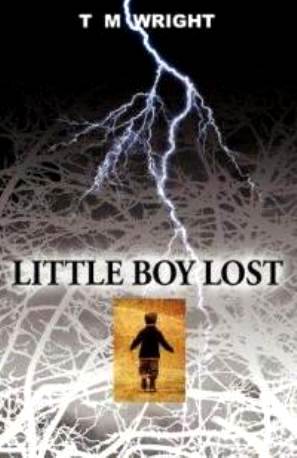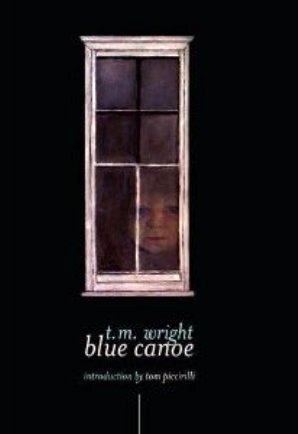

The March Special Guest Story is by
T. M. Wright
Please feel free to visit Terry HERE

THE MARYBELL WOMEN
By T. M. Wright
Grissom read the names—Abigail, Caroline, Rebecca, and Mary Anne Marybell—and wondered again (because all the names were on the same tall tombstone) if the women were buried in the same grave.
He asked his wife about it and, again, she answered, “That would be impossible, don’t you think?” She gave him a smile he generally thought of as patronizing—and which often made him angry—and realized she was right: how, indeed, could four women share the same grave? “Maybe there are four coffins.”
His wife shrugged. “Sure,” she said. “Four coffins.” Then she looked about, sighed, and gave him a glance filled with agitation. “Are we done here?”
“Uh-huh,” he answered, but he was studying the Marybell tombstone, again, and hadn’t really heard his wife. He was looking for more information somewhere on the tombstone—dates of birth and death, a notation which would indicate that no one, in fact, was actually buried there. “In Memoriam,” for instance. The story demanded more information. But the tall, dark gray stone bore only the women’s names (in heavily stylized script), which Grissom, once more, found hugely unsatisfying.
His wife said, “You know there are wood rats out here.”
He looked at her. She was scowling. “No there aren’t,” he said. “The town keeps things clean.”
She shrugged. “Wood rats don’t care about clean.”
Grissom said, “I’ve never seen a wood rat here. Shit, I’ve never seen a wood rat. I don’t think you have, either.” He wondered briefly if he’d told her this before, and how many times?
She was only a few feet away; she came forward, leaned over—because he was on his haunches in front of the tombstone—and said into his face, “I’ve seen wood rats. I’ve seen lots of them. They’re bigger than other rats—city rats. They’re furry; they have long brown fur. And they’re not afraid of anything.”
He stood, which made her move away suddenly and stumble backward. He reached quickly for her, caught her hand, kept her from falling. She looked momentarily confused. He still had a hold on her hand; she looked at it, then at him, and said, “Thank you. I’m sorry.”
He was thunderstruck. She never said she was sorry. He didn’t know how to respond.
She said, “Can we go, now?”
He let go of her hand, which she let hover in the air for a moment, and said, “Yes, we can go.”
*****
He went back to the tombstone of the Marybell women later that week. It was an early morning as bright as midsummer allowed, and not unpleasantly hot, but the sole of his right foot ached—a chronic aliment with him. He though he must have had some kind of tell-tale look on his face when he came into the kitchen, where she was having toast with jam, and coffee, too, because she looked up from the table and said, through a mouthful of toast, “You’re going to that cemetery, aren’t you?” She gave him a small, half smile.
“Yes, I am.” He nodded at her. “There’s jam on your lips.”
She harrumphed. “I’m not going with you. I can’t.”
“You wouldn’t want to, anyway,” he said.
“I don’t know if that’s true,” she said, and wiped her lips on her napkin. “You need looking after.”
“No I don’t.”
“Yes, you do. You always have. You just don’t know it.”
He sighed. “Whatever you say.” Another sigh. “I won’t be long. I’m just trying to get some ideas for the story.”
“Of course you are.” Another half smile. “The story,” she whispered, as if it was a phrase whose meaning eluded her. She bit into a piece of toast. “Good jam,” she said. “Raspberry.” She pointed at the opposite side of the table. “You should eat first.”
He shook his head, said, “Not too hungry, I guess,” bent over and kissed her (a routine he could not break: in the time they’d been together, he had always kissed her upon leaving the house, no matter what his mood, or hers), added, “I’ll see you later,” and was at the grave of the Marybell women half an hour later.
*****
He found three names. Not four. Caroline, Rebecca, and Mary Anne. He couldn’t remember what the fourth name had been and he felt certain he’d only imagined it because names do not simply dissolve from tombstones in a couple of days. And the remaining names were etched deep into the stone; certainly it would be centuries before the elements erased them completely. It was a puzzle he found intriguing and he thought about it for a while, though he came to no conclusions, found no solutions; he did notice a small jagged, horizontal crack in the gravestone, just below the names, and he decided it was possible it had made him imagine the fourth name, whatever it had been.
Three dead women, then. Not four. And dead how? Accident? Misadventure? He liked the word. Misadventure. It seemed oddly comforting and familiar, like an old glove. He decided he’d use it in the story.
When he arrived home, his wife was sewing a button on his long-sleeved gray shirt. She liked to sew, said she found it relaxing, but he couldn’t remember if she’d ever sewn any of his clothes.
She looked up at him from the couch and said, “You’ve got to be more careful, Grissom. Buttons are hard to come by.” She gave him a smile that was clearly designed as rebuke and forgiveness at the same time, and he noticed, after she’d spoken, an odd odor in the room, as though it had come from her mouth.
“Are they?” he said.
She was looking at his shirt, which she’d lain across her lap, and her long, white fingers were busily and expertly sewing a button on it, thought the button was black, and the other buttons were white. “They?” she said, gave him a quick glance, then busied herself with the button again.
“Yes, buttons? Are they really hard to come by?”
“As hard as hen’s teeth,” she said, held the shirt up, looked admiringly at it, stood, went over to Grissom, and said, “Okay, fixed. Watch what you’re doing next time, okay?”
He took the shirt from her and said, “Have you been eating peanut butter?”
“No,” she said, “nothing.”
“That’s an odd answer,” he said.
“Yes,” she said, “I’m odd.” Which, he thought was also an odd answer, and he nodded and went into his office/bedroom. He’d wanted to add, “Or garlic,” but thought it would be rude, and he was rarely rude.
*****
She came to him sometime later, after he’d fallen asleep in his office chair; he was awakened by her hands on his shoulders, her long hair on his cheek, her warm breath on the top of his head. She smelled good, now. Her usual scent—a perfume or essential oil which blended nicely with her natural, early odor.
He said, “That feels good, Abby.
She said, “Oh yes, I’m sure it does. We all need these little pleasures. These small comforts.”
He turned his head a little to look at her, though, in the early evening light, he thought he’d see little. She gently turned his head back, said, “No, it’s all right, Grissom—no need to look.”
He said nothing. She rubbed his shoulders for a long while, until the light in the room was all-but-gone, then she led him to the bed, stripped, stripped him, and they made love. When they were done, and lying beside each other, hands clasped, he said, “We’re together simply for this, aren’t we?”
She didn’t answer at once, so he repeated the question. She said, on an outflow of breath, at a whisper, “Who’s to find anything wrong with it? Grissom, you’re a foolish man.”
He couldn’t tell if she were joking, and he didn’t want to pursue the matter. He knew it would simply make him angry. She’d become much more pleasant than usual in the past few days and he thought that if he questioned her about it, she’d become the Abby he’d know for what seemed like a very long while now.
*****
The next morning, he asked her to go with him to look at the tombstone of the Marybell women and she said yes, which surprised him.
“You’re sure?” he asked.
“Have you ever known me to say yes when I meant no?” she said.
He hadn’t, and he told her so.
They were standing in front of the Marybell tombstone a half hour later. She stood just beside him, her hand touching his lightly, as if she wanted to hold hands, but when he tried to take her hand, she moved it away quickly and he gave her a glance: “You know I don’t like to hold hands, Grissom,” she said.
He didn’t know it, he told her.
She nodded at the tombstone. “I think they’re all buried here,” she said. “All three of them in one large coffin. One on top of another. One decomposing onto the other.”
“Who’s to know?” Grissom said.
“Who indeed?” she said, and gave him a flat smile which he did not understand.
The morning was oppressively hot. Grissom had begun to sweat. There were times when he actually liked to sweat, but this was not one of those times.
“You’re sweating,” his wife said.
“It’s hot,” he said.
“I don’t like it when you sweat,” she said. “It’s disgusting. You become befouled with it.”
He glanced at her. “Befouled?”
She looked at him. Her gray eyes were wide, her lips set. “Don’t sweat,” she told him sharply. “It attracts mosquitoes. And wood rats.”
He smiled at her. She didn’t return his smile. She said, tightly, “Grissom, I know about wood rats.” Her breath smelled of meat. “I have been beset upon by them as I lay in my bed.”
He furrowed his brow, cocked his head. “‘Beset upon by them’?”
She stood on her tiptoes so her face was very close to his: “And they’ve taken vital parts of me off into their hidey holes in the hellish woods!”
He wanted to tell her about her breath, but didn’t know how to broach the subject without upsetting her, which would upset him. And he wanted to tell her she was acting very oddly. He considered a moment and said, “Jesus, you sound strange.”
She settled back on her heels, looked silently at him for a few moments, glanced quickly about. “Oh,” she said, while looking away from him, “it is all your business, is it not? All the stuff that you have made!”
“Sorry?” he said.
She looked at him, again. Her large gray eyes were distant, as if she were looking through him. “Take my hand, then, and we’ll leave this place, for who would want to fall here and not be rescued?”
*****
Over a dinner of lamb, greens, and mashed potatoes, she asked him, “What’s your story about?”
He looked questioningly at her across the small table and said, “I’m surprised you’d ask.”
“I’m asking,” she said, and popped a forkful of mashed potatoes into her mouth. “I’m interested,” she added as she chewed. And she smiled a little, too, though her potatoes were not yet completely chewed.
The overhead fixture and its five 100-watt bulbs washed the room in light and Grissom hated it; more than once, he’d removed three of the five blubs from the fixture, only to later find that his wife had replaced them. He glanced quickly at the fixture, sighed, glanced at his wife’s face—ghastly pale in the bright light—and the remnants of potatoes at one corner of her mouth (she was still smiling, as if expectantly), and said, “It’s about the Marybell women.”
Her smile became crooked. She cocked her head. Stopped smiling. Chewed her potatoes. Swallowed. “Whatever the hell for?” she asked; he thought he heard a note of anger in her voice and he wondered, in so many words, Why is she angry?
He shrugged and began to speak, but she interrupted, “Why in the name of all that’s holy would those women interest you, Grissom? They’ve…” She paused. “Jesus, they’re…” She glanced quickly about, as if searching for the right word, then looked at Grissom again. “They’re goddamn boring!” she said. “They’re as boring as…as…” She glanced around again. “They’re as boring as death!”
He shrugged once more. He wanted her to simply finish her meal and leave him alone. He thought he would become angry if she didn’t. “Abby,” he said, and he could hear his voice tremble a little as he tried to keep his temper. “I don’t think they’re boring. I don’t even know them. The real Marybell women. Neither do you.”
She continued to look hard at him for a moment, then at her plate, then at her fork, which she clutched in her hand, then at Grissom once more, at the plate, again: she said, as she stared at the plate—she’d eaten half the greens and lamb and potatoes—“Well Grissom,” (she spoke nearly at a whisper; if her words had not been sharply enunciated, he thought he wouldn’t have understood them). “Okay. Yes, I acquiesce.”
He smelled her from across the table. The odor of meat. He wanted to say something about it. After a moment, he said only, “You acquiesce?”
She looked at him. Her gaze was soft. The fork fell from her hand and clattered to the plate, which made Grissom lurch a little. She said, “This opportunity to rise”—a quivering smile spread across her mouth—“and to love and to lust…”—her smile broadened—“Grissom…” She looked softly at him for a long time, while he looked back, and then she looked at her plate again: “And to eat,” she said.
Grissom said nothing.
“And to eat,” she repeated.
*****
Grissom saw the wood rats at the cemetery that afternoon. They were as large as dinner plates and they regarded him as if he were of no consequence—a shadow moving among the stones.
He thought there were dozens of them, but he was wrong. Three or four or five wood rats in a place such as that can appear to be dozens, and he knew it, but he saw dozens anyway—they moved with an ambling, jittery gracelessness that was jarring in the stillness, and threatening enough that he stepped quickly to one side as they moved past, though he knew, down deep, that it was unnecessary.
But as he stood at the grave of the Marybell women—and the sun through the trees dappled the gray stone with a cheerful yellow light—the wood rats ambled away and were gone, and he read the names on the tombstone to himself, at a whisper—“Caroline, Mary Anne, Rebecca”—and reached out and fingered the names as he said them, one after the other.
“The Marybell women died unhappily,” he said, still touching the stone, and quoting the little story he was trying to write, which was many, many words shy of being done, because he was no writer. “Victims one and all of horrible circumstance.”
He dropped his hand.
And heard his wife move toward him through the short grasses: she moved, always, in near-total silence. He felt her hands on his arms. Such strength in her hands. She said, her voice no less musical and urgent than the voice of the wind, “You have so little to say, Grissom. And you will never say it.”
He put his hand on her hand. It was no warmer than the summer air, no softer than bone.
“You must tell me what is,” he said, without turning to look at her; he had looked at her more than once. “It is only fair and just.”
“We are no more fair and just,” she said, “than anything that breathes, my love. How can it be otherwise?”
He had no answer.
She asked again, “How can it be otherwise?”
*****
When he arrived home, he did not find Abby in her usual places—at the kitchen table, a good meal in front of her, or in the bedroom, played out on the bed, or in the cavernous attic, where she often rummaged through the musty old things Grissom always assumed had been left by the house’s previous owners.
He found her at last, around the back of the house. She was smiling very broadly, as if her face had acquired strange new muscles, and her large gray eyes were open as wide as eggs, and she was sitting in a stiff wooden chair, long gingham dress dreadfully askew, and so inappropriate in the suffocating summer heat.
He spoke to her—to her improbable smile and her eyes big as eggs, to her graying skin, her blood:
“Would that I were sorry,” he said, “then this would be only a moment that passes.”
*****
“It was his anger,” he read aloud, and squinted to read the rest of the sentence because his handwriting was awful, “and their quixotic natures—always unpredictable, which delivered him daily into madness. What else could he do? Only that which was just and right, for his own sake.
“But he was a good man—too good to be held accountable, even to himself, for such acts.
“Though how not accountable? How not accountable?”
He paused. Read on:
“The Marybell women died unhappily, one after the other. Victims one and all of horrible circumstance.”
*****
Grissom read the names and wondered again (because all of the names were on the same tall tombstone) if the women were buried in the same grave, perhaps the same coffin. He asked his wife about it and, again, she answered, “Yes, all one on top of the other, all decomposing into each other, all but the woman on the bottom, who suffers from the weight of so much decay.”
Grissom looked at his wife and smiled, “You have a dreadful sense of humor, Becky.”
She smiled back. “I do, yes,” she said. Her breath smelled of newly fallen leaves. It was a good smell and fit the season.
Grissom reached out and touched the tombstone of the Marybell women. “Odd,” he said, “but I could swear there were four names yesterday. I was sure of it.”
His wife reached out and put her hand on his, and it touched the tombstone. “The dead cannot be accounted for by name, my love,” she said. And their hands were no colder than the late autumn air, no softer than bone.
T. M. Wright is revered by writers and critics as one of the great writers of dark fiction. He is also a painter and artist. He has written 32 novels. He manages daily life with Parkinson's. He lives outside Corning, New York with his wife, Roxane, and their two dogs and six cats. All are rescue animals they've acquired over the past eight years.
You can find all of T. M. Wright's books HERE


